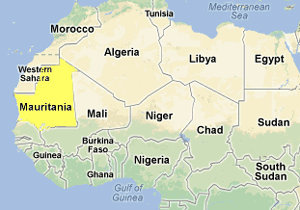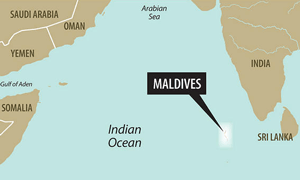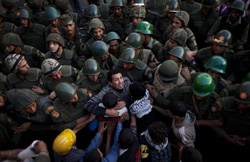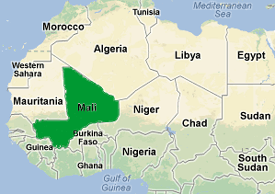News from Mauritania and Maldives, Egypt and Mali
Tuesday's World Events — Posted on December 11, 2012
MAURITANIA AND MALDIVES – UN Human Rights Council gives posts to “unfree” countries
 Mauritania and Maldives, which both permit citizens who renounce Islam to be sentenced to death, were on Monday elected as vice-presidents of the United Nations Human Rights Council in 2013.
Mauritania and Maldives, which both permit citizens who renounce Islam to be sentenced to death, were on Monday elected as vice-presidents of the United Nations Human Rights Council in 2013.
Poland was chosen to chair the council next year with Ecuador and Switzerland named as the other vice-presidents of 47 member body. Mauritania and Maldives were elected as representatives of their regional council groupings. …
In a report detailing persecution and discrimination faced by atheists and humanists around the world, International Humanist and Ethical Union (IHEU), said both countries impose Islam as the sole religion of the state.
Mauritania, the report said, outlaws apostasy, or the renunciation of the official religion [Islam] for another or for a philosophy that does not recognize the existence of a deity.
Anyone found guilty of the offense is given the opportunity to repent within three days, according to the report. If this is not done, the offender is sentenced to death and his property is confiscated by the state.

The report…says in Maldives “the constitution and other laws do not permit freedom of religion or belief.”
The report recorded two cases in 2010 in which Maldivians who declared publicly they could not believe in Islam or any other religion were told they would face death if they did not renounce their views.
One subsequently declared after special education he accepted Islam and the other committed suicide after writing a note saying he had been foolish to reveal his stance on religion to workmates, the report said.
The report said atheists and other religious skeptics [such as Christians and others who don’t believe in Islam] suffer persecution or discrimination in many parts of the world. They can be executed if their beliefs become known in [the Islamic countries of] Afghanistan, Iran, Pakistan, Saudi Arabia and Sudan, as well as Mauritania and Maldives.
EGYPT – Army given temporary power to arrest civilians

Egyptian protesters and army soldiers standing guard in front of the presidential palace in Cairo, Egypt, Sunday, Dec. 9, 2012.
Egypt’s Islamist president has given the army temporary power to arrest civilians during a constitutional referendum he is determined to push through despite the risk of bloodshed between his supporters and opponents accusing him of a power grab.
Seven people were killed and hundreds wounded last week in clashes between the Islamist Muslim Brotherhood and their critics besieging President Mohammed Morsi’s presidential palace. Both sides plan mass rallies [today].
The elite Republican Guard has yet to use force to keep protesters away from the palace, which it ringed with tanks, barbed wire and concrete barricades after last week’s violence.
Morsi, bruised by calls for his downfall, has rescinded a November 22 decree giving him [almost absolute] powers but is going ahead with a referendum [nationwide vote] on Saturday on a constitution [widely criticized by secularists and other non-Islamists as violating freedoms].
A decree issued by Morsi late on Sunday gives the armed forces the power to arrest civilians and refer them to prosecutors until the announcement of the results of the referendum, which the protesters want cancelled. …
A military source stressed that the measure introduced by a civilian government would have a short shelf-life. “The latest law giving the armed forces the right to arrest anyone involved in illegal actions such as burning buildings or damaging public sites is to ensure security during the referendum only,” the military source said.
Presidential spokesman Yasser Ali said the committee overseeing the vote had requested the army’s assistance. “The armed forces will work within a legal framework to secure the referendum and will return (to barracks) as soon as the referendum is over,” Ali said.
Protests and violence have racked Egypt since Morsi decreed himself extraordinary powers he said were needed to speed up a troubled transition since [ousted long-time President Hosni] Mubarak’s fall 22 months ago. …
Critics say the draft law puts Egypt in a religious straitjacket. Whatever the outcome of the referendum, the crisis has polarized the country and presages more instability at a time when Morsi is trying to steady a fragile economy. …
MALI – U.S., France differ over how to deal with “explosive” Mali
 Northern Mali, plagued by Islamist extremists and gripped by an aid disaster, is “one of the potentially most explosive corners of the world,” the United Nations warned on Monday, as the United States and France differed over how to tackle the crisis.
Northern Mali, plagued by Islamist extremists and gripped by an aid disaster, is “one of the potentially most explosive corners of the world,” the United Nations warned on Monday, as the United States and France differed over how to tackle the crisis.
Almost 350,000 Malians have fled their homes, with about 40 percent of those sheltering in neighboring countries, said the United Nations, exacerbating a humanitarian crisis in the Sahel – a belt of drought-stricken land spanning nearly a dozen impoverished countries on the southern rim of the Sahara from the Atlantic Ocean to the Red Sea.
“Protection concerns are growing, with widespread reports of serious human rights violations…” U.N. High Commissioner for Refugees Antonio Guterres told the U.N. Security Council. “Northern Mali … (is) one of the potentially most explosive corners of the world.”
Mali descended into chaos in March when soldiers toppled the president, leaving a power vacuum that enabled Tuareg rebels to seize two-thirds of the country. But Islamist extremists, some allied with al Qaeda, have hijacked the revolt.
U.N. Secretary-General Ban Ki-moon cautiously recommended last month that the Security Council approve an African Union military operation to take back northern Mali, contingent on political, human rights, training and operational benchmarks being met.
France has circulated a draft resolution to approve such a mission, but the United States has countered with a proposal that the operation be split into two missions – one political and one military – that would be mandated separately by the 15-member Security Council, diplomats said.
France, which has seven nationals held hostage in the desert region, wants the council to adopt a resolution this month.
One senior Security Council diplomat, who spoke on the condition of anonymity, said that the United States was “highly skeptical about the way the French want to go” and have strong doubts about whether a military mission could be successful.
“The U.S. was completely unsatisfied with the state of planning by (West African regional body) ECOWAS for the mission; there’s little trust in the African troop contributors that they can do the job, and little trust in the Malian army,” he said. …
(The news briefs above are from wire reports and staff reports posted at Reuters on Dec. 10, and YahooNews on Dec. 10.)
Background
THE U.N. HUMAN RIGHTS COUNCIL:
- The United Nations General Assembly established the Human Rights Council (HRC) on March 15, 2006 “to strengthen the promotion and protection of human rights around the world.” The council replaced the UN’s Human Rights Commission, which had been created in 1946 with a similar mission. (from about.com)
- According to human rights groups, the U.N.’s Human Rights Council is controlled by a bloc of Islamic and African states, backed by China, Cuba and Russia, who protect each other from criticism.
- UN Secretary General Ban Ki Moon and former High Commissioner for Human Rights Mary Robinson have criticized the council for acting according to political considerations as opposed to human rights.
- The United States boycotted the Council during the George W. Bush administration, but reversed its position on it during the Obama administration. (from wikipedia.org)
NO RELIGIOUS FREEDOM IN MAURITANIA: The distribution of Christian literature and the evangelizing of Muslims are prohibited by law. Bibles are rarely printed or distributed. State oppression has included the arrest of Mauritanian Christians due to their religious beliefs and the closure of churches. Conversion from Islam is punishable by death and other religions are not recognized by the state. (from wikipedia)
MALDIVES: Every citizen has to be Muslim on these remote islands. The Maldivian government views itself as the protector and defender of Islam and enjoys full support by its citizens. Churches are forbidden, evangelism is banned and the import of Christian literature is prohibited. Christians hide their faith from their families and, when discovered, are pressured to convert to Islam. In October, a foreign Christian teacher was imprisoned for 15 days and then deported after police found a Bible in his house. (from worldwatchlist.us)
EGYPT:
- Rejecting the referendum plan [a vote on a new constitution written by Morsi's Islamist Muslim Brotherhood supporters], opposition groups have called for mass protests on Tuesday, Dec. 11, saying Morsi's eagerness to push the constitution through could lead to "violent confrontation."
- Islamists have urged their followers to turn out "in millions" the same day in a show of support for the president and for a referendum they feel sure of winning with their loyal base and perhaps with the votes of Egyptians weary of turmoil.
- The opposition National Salvation Front, led by liberals such as Mohamed ElBaradei and Amr Moussa, as well as leftist firebrand Hamdeen Sabahy, has yet to call directly for a boycott of the referendum or to urge their supporters to vote "no."
- Instead it is contesting the legitimacy of the vote and of the whole process by which the constitution was drafted in an Islamist-led assembly from which their representatives withdrew.
- The opposition says the document fails to embrace the diversity of 83 million Egyptians, a tenth of whom are Christians, and [instead allows] Muslim clerics to influence lawmaking. (from the yahoonews news brief)
MALI
Al Qaeda imposes Islamic Sharia law on Mali:
- Human Rights Watch spokeswoman Corinne Dufka reported at the end of September 2012: “The Islamist armed groups have become increasingly repressive as they have tightened their grip over northern Mali. Stonings, amputations and floggings have become the order of the day in an apparent attempt to force the local population to accept their world view.”
- The Islamists’ efforts to impose Sharia law has also extended to banning ring tones on mobile phones that are not Koranic verse readings, as well as prohibiting cigarettes and alcohol.
- Women who wear jewelery or perfume, or fail to cover their heads can also face punishment, Human Rights Watch said in its report on Sept. 25.
SHARIA LAW
Unlike many religions, Islam includes a mandatory and highly specific legal and political plan for society called Sharia. The precepts of Sharia are derived from the commandments of the Quran and the Sunnah (the teachings and precedents of Muhammad). Together, the Quran and the Sunnah establish the dictates of Sharia, which is the blueprint for the good Islamic society. Because Sharia originates with the Quran and the Sunnah, it is not optional. Sharia is the legal code ordained by Allah [the god of Islam] for all mankind. To violate Sharia or not to accept its authority is to commit rebellion against Allah, which Allah’s faithful are required to combat.
There is no separation between the religious and the political in Islam; rather Islam and Sharia constitute a comprehensive means of ordering society at every level. While it is in theory possible for an Islamic society to have different outward forms — an elective system of government, a hereditary monarchy, etc. — whatever the outward structure of the government, Sharia is the prescribed content. It is this fact that puts Sharia into conflict with forms of government based on anything other than the Quran and the Sunnah. (from jihadwatch.org/islam-101.html)
CONCERNS ABOUT MILITARY ACTION IN MALI:
- ECOWAS [The Economic Community Of West African States] has agreed to commit the 3,300 troops for an international force in Mali. The troops would mostly come from Nigeria, Niger and Burkina Faso, but other West African countries and two or three non-African states may also contribute, Ivory Coast President Alassane Outtara has said.
- U.N. Secretary-General Ban Ki-moon did not offer financial support for an initial combat mission in Mali. The African Union has said it would need "a U.N. support package funded through assessed contributions to ensure sustained and predictable support to the mission."
- U.S. ambassador to the United Nations, Susan Rice, told the council that the world body must be careful to address the crisis in Mali without destabilizing the entire Sahel region.
- Ban's special envoy for the Sahel, former Italian Prime Minister Romani Prodi and U.N. peacekeeping chief Herve Ladsous have said that any military action in northern Mali was unlikely to happen until September or October next year.
- The Security Council issued a statement expressing serious concern over the insecurity and humanitarian crisis in the Sahel and condemning rights abuses including executions, hostage-taking, people trafficking and recruitment of child soldiers. (from the Reuters news brief)
